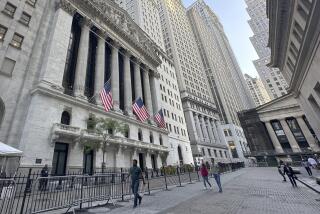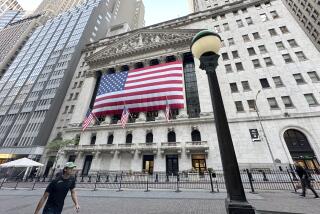FINANCIAL MARKETS : Stocks, Dollar Fall on Jitters; Bond Yields Rise
- Share via
Stocks and the dollar fell, while bond yields rose Monday as wary investors awaited the outcome of an interest rate policy meeting and worried about the consequences of Mexico’s financial crisis.
The Dow Jones average, down more than 40 points at one point, managed a partial recovery in late trading and closed well above its worst reading of the day at 3,832.08, off 25.91 points.
Broader market indicators also declined. The New York Stock Exchange composite index dropped 0.98 point to 254.91, and Standard & Poor’s 500 stock index fell 1.88 points to 468.51. The Nasdaq Stock Market composite sank 7.08 points to 751.83, and the American Stock Exchange market value index slid 3.21 points to 433.54.
Losers outnumbered gainers by more than 5 to 3 on the NYSE, where volume came to 318.56 million shares, down from 339.49 million shares on Friday.
Weakness in the dollar also contributed to Wall Street’s setback.
In New York trading, the dollar fell to 1.505 German marks from Friday’s 1.515 marks. The dollar last closed at this level on Oct. 31. The dollar also traded at 98.35 Japanese yen, down from 99.25 yen.
The dollar’s decline pushed long-term Treasury bond yields higher, dampening investor demand for long-term bonds.
The bellwether 30-year bond closed at 7.76%, up from Friday’s 7.73%. Its price, which moves in the opposite direction, fell 13/32 point, or $4.06 per $1,000 in face value.
The main focus of attention in the financial markets was this week’s meeting of the Federal Reserve’s policy panel. The likely outcome of the Federal Open Market Committee meeting today and Wednesday is a half percentage point hike in short-term interest rates, many economists believe.
Despite the widespread expectation of an imminent rate increase, analysts said investors seemed unwilling to stake out significant new market positions ahead of the meeting. Short-term rates were nudged up six times last year while the Fed sought to keep inflation under control by curbing economic growth.
Also of immediate concern for the markets is the fate of the Mexican bailout package. It remained uncertain late Monday whether Congress would approve the Clinton Administration’s $40-billion aid package, and there was speculation that failure to do so could harm the U.S. economy.
Mexican and other Latin American shares were hammered on Wall Street. Mexico’s Bolsa index dropped 58.75 points to end the day at 1,898.90, its fourth straight declining session and its lowest closing level since Oct. 8, 1993.
Other overseas stocks were mixed. Tokyo stocks rocketed up 648.53 points, or 3.58%, to 18,752.88. In London, the Financial Times 100-share average closed at 2,995.9, down 26.3 points. Frankfurt’s 30-share DAX average was up 3.33 points at 2,035.03.
Among the market highlights:
* Reflecting the fear of fallout from Mexico’s troubles, investors dumped Mexican stocks. Telefonos de Mexico was the most actively traded stock on the NYSE, tumbling 2 to 30 3/4. Construction company Grupo Tribasa fell 7/8 to 9 1/8, and glassmaker Vitro shed 1 1/8 to 9 3/8. Compania de Telefonos de Chile sank 3 3/4 to 69.
Investors continued to shift out of stocks in cyclical companies whose earnings are seen as vulnerable to an economic slowdown, and instead bought those less linked to the economic cycle, including household products makers.
* Among cyclical stocks, Aluminum Co. of America lost 3 1/4 to 77 1/2, and Caterpillar dropped 1 1/8 to 51 5/8.
* Meanwhile, Procter & Gamble rose 1 to 65 3/4, and Gillette gained 1 3/4 to 77 3/4.
* Louisiana Land & Exploration lost 5 1/8 to 32 3/4 after the company late Friday posted a fourth-quarter loss of $6.64 a share, including a $210.3 million after-tax charge, and slashed its annual dividend.
* Promus Co. climbed 1 5/8 to 32 7/8 after saying it will split its casino and hotel businesses into two independent public corporations.
More to Read
Inside the business of entertainment
The Wide Shot brings you news, analysis and insights on everything from streaming wars to production — and what it all means for the future.
You may occasionally receive promotional content from the Los Angeles Times.










